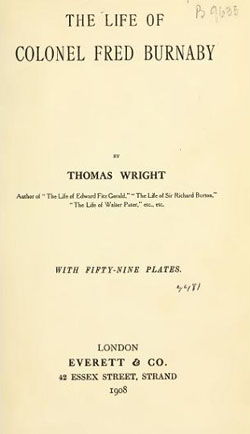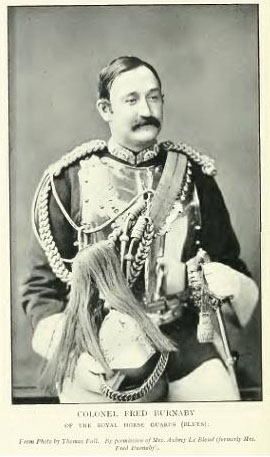Journal Volume 1 1992
Colonel Burnaby (continued/1)
About the year 1802 the British authorities in Dublin feared an invasion by the French Republican forces, Admiral Whitshed was given the task of building defences along the coast: hence the few Martello towers which are to be seen today. So the Irish interest in the affairs of Colonel Burnaby is very centred around his Irish connections with his Irish bride living in Killincarrig House.
The marriage over, the young couple journeyed to Algiers but on route near Marseille they were snow bound and Mrs. Burnaby became ill. In Algiers she was diagnosed as being in the first stages of TB. On the doctor's orders Colonel Burnaby took his young wife to Switzerland where she benefited from the Alpine air and spent a lot of her life there during which she compiled some books on Alpine fauna. So much for Mrs. Burnaby, née Hawkins.
Now let us turn the narrative to relate the affairs of the gallant Colonel Burnaby himself. He was indeed a 100% English gentleman of the Queen and Empire type: brave, enterprising, adventurous, an intrepid traveller, a good linguist and author.
The Battle of Abou Klea
 As part of the campaign to rescue General Charles Gordon besieged in Khartoum, Colonel Burnaby received orders on 28th December 1884 to move to Korti, a place between Debbah and Merani in Sudan.
As part of the campaign to rescue General Charles Gordon besieged in Khartoum, Colonel Burnaby received orders on 28th December 1884 to move to Korti, a place between Debbah and Merani in Sudan.
On January 8th he reached Korti, where he learnt, to his joy, that a few days previous an Arab messenger had brought in a slip of paper, some two inches square, containing the following cheery message, ‘Khartoum all right. December 14th. C. G. Gordon.’ The messenger had added that Gordon looked well, while his men, who knew that Lord Wolseley was advancing to their aid, were in excellent spirits. Next morning Sir Redvers Buller, as Chief of the staff, placed Burnaby in charge of a convoy of grain, which was to be taken to Gadkul, and instructed him to join General Stewart's column if possible. He overtook the column at Gadkul very early in the morning of January 13th, and while handing over the convoy of grain he enquired: ‘Am I in time for the fighting?’
‘Oh yes, was the reply, ‘we shall not march out till four.’
The advance commenced at the time expected, and on the evening of the 15th a halt was made near a high hill.
Next morning the column started again before daybreak, but owing to the difficulty of carrying forage, only a few of the officers, including Sir Herbert Stewart, Lord Airlie, and Frank Rhodes, were mounted. Burnaby was on a grey polo pony named Moses, which had been lent him by Lieutenant Percival Marling. Lord Charles Beresford rode a mule, his blue-jackets were on camels, but the rest were on foot. Would they reach Khartoum in time to save Gordon? That was the great question. They halted some four hundred yards from the foot of the bleak and rugged ridge which forms part of the caravan route to Abou Klea; and then General Stewart and his staff, including colonel Burnaby, went forward to reconnoitre.  On topping the ridge they could see, by aid of their glasses, the army of the enemy so disposed as to dispute the further advance of the column; and, having returned to his men, the general gave the order for a zereba to be formed, while pickets were placed on the hills. The soldiers slept in the zereba in their great coats with bayonets fixed; for during the whole of the night could be heard the distant sound of the tom-tom, while the bullets of the enemy hissed overhead, or dropped into the square, mortally wounding several men, including Lord St. Vincent of the 16th Lancers. Twice during the night the pickets were driven in and the men called to arms.
On topping the ridge they could see, by aid of their glasses, the army of the enemy so disposed as to dispute the further advance of the column; and, having returned to his men, the general gave the order for a zereba to be formed, while pickets were placed on the hills. The soldiers slept in the zereba in their great coats with bayonets fixed; for during the whole of the night could be heard the distant sound of the tom-tom, while the bullets of the enemy hissed overhead, or dropped into the square, mortally wounding several men, including Lord St. Vincent of the 16th Lancers. Twice during the night the pickets were driven in and the men called to arms.
Burnaby, who wore a big pilot jacket lined with astrakhan, had been appointed by General Stewart to the command of the left flank and rear of the square, and he virtually discharged the duties of a brigadier general. To Mr. Bennet Burleigh, who was by his side during the earlier part of the night, he expressed his satisfaction at having arrived in time for the approaching battle. ‘I have got to that stage of life’, he observed, ‘when the two things that interest me most are war and politics; and I am equally exhilarated and happy whether holding up to odium an unworthy politics again on my return, for, next to war and fighting, there is more fire and go in that than in anything else. Besides, wars are going out of fashion. Politics give me a course and stir my blood.’
They talked together by the hour, joking and laughing - Burnaby championing the Tory cause, Burleigh, the Social Democratic; indeed, General Stewart, more than once, asked them to be silent.
‘Do you think’, said Captain Hippesley, to Burnaby, ‘the enemy will come on and attack our entrenchment?’ ‘No such luck,’ replied Burnaby. ‘We shall have to go forward and attack them’ - and then, his mind running on the intolerable thirst from which the column had suffered, and the immense hordes of the enemy, he added, ‘At home it is wine and women, but out here, from what I can see, it's men and water.’


